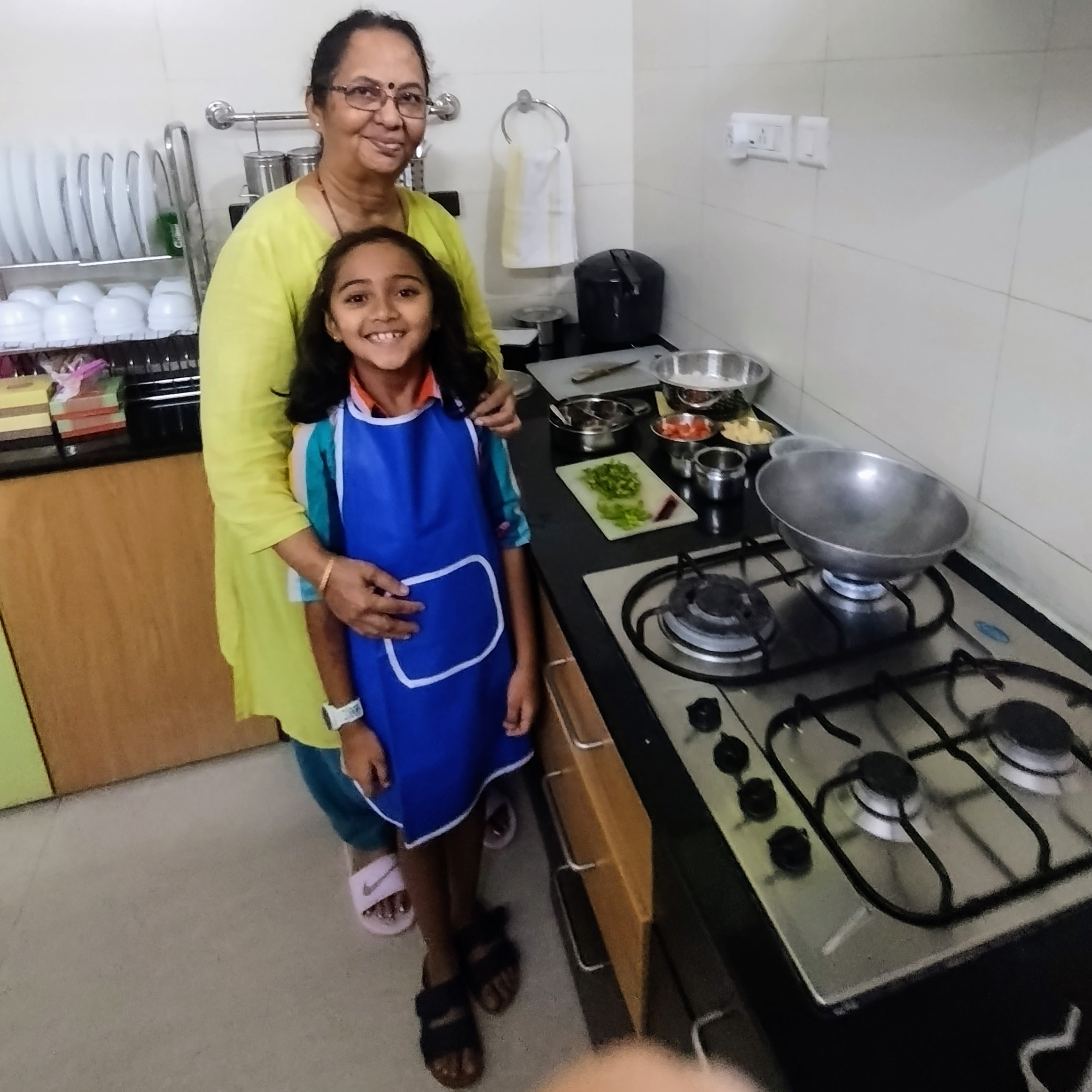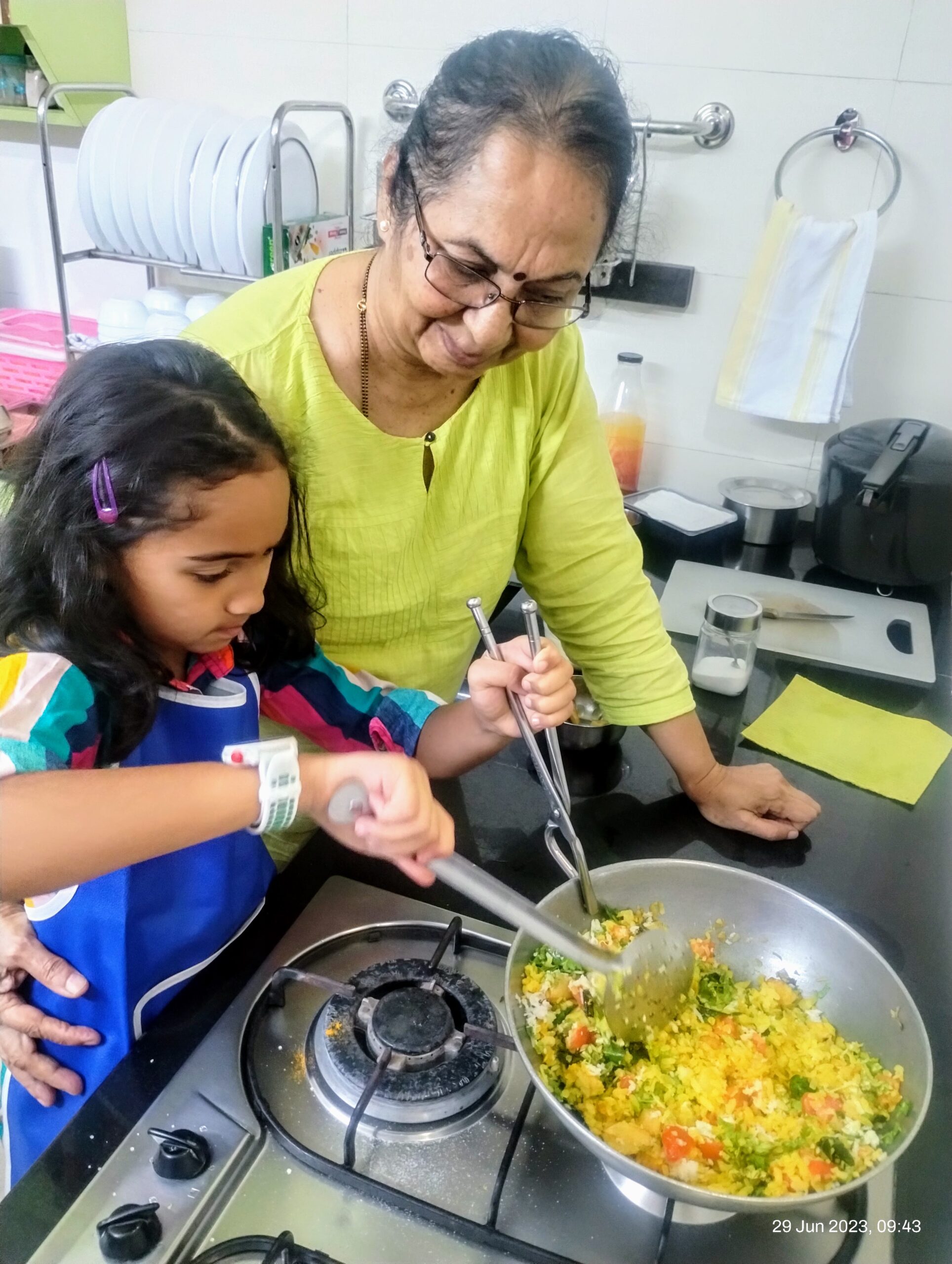
My dear Kymyko, my Michiko, my little baby Turtle,
I’d like to congratulate you on two things today: your exemplary, loving, and empathetic behaviour with and treatment of Aji (thank you!!), and for starting on your new journey as a chef. The poha you made was excellent! Yummy, in fact. I had two plates.
I have only praise for the former, but for the latter, I have some advice in the form of simple rules for you to follow to make this newfound love for this skill (art?) worthwhile, enjoyable, and productive. Remember that this is from a non-chef (and how terribly I regret not having developed this skill in my youth), and is mostly generalised advice modified with common sense to fit your new interest. There are 13 rules in number (did you know 13 is called a ‘Baker’s Dozen’ because bakers were scared of being arrested for shortchanging the customer in the 16th century UK? Or in some parts of the world, a ‘Baker’s Dozen’ is 14, and in some others, it is 15? Well, you know now! Anyway, without further ado (or digression), here goes:
- Pay attention: Whatever you do, always be 100% in the present. In a sense, if you are learning how to cook, clean up your mind of all distractions and unrelated thoughts & worries. Focus on the task at hand. This has many benefits, the most important of which is that your homework is reduced to almost zero (not zero, but almost). Why? I’ll explain with a story of my life. You see, when Baba was in school, he figured out a way to find more time to play and explore about and around the subject he was learning in school: by simply paying attention in class. Baba was totally focused in class and took extra efforts to understand what the teacher was teaching, including asking the teacher any questions that came to him right there, while many of his contemporaries were thinking of what they had in their tiffins for lunch and what the latest cricket match’s score was. The upshot of this was that Baba needed very little time to do his homework and to revise and polish his understanding of the subject after school while most others struggled. That way, he got extra time to do other stuff he wanted to (including play time) and still ace his exams! So, remember this hack: focus in class so you have to sweat less after it.
- Be prepared & organised: Have your pen, paper, apron etc., ready, have the correct dress and shoes on, have your tummy full & thirst quenched, go to the bathroom before starting, keep your phone on silent and only then, start your class. And in class, make sure your ingredients are all taken out and ready, chopped or processed in whatever way needed and in the correct quantities and quality, kept in the right containers in the right place (some chefs prefer their ‘mise en place’, a French phrase pronounced ‘mee-zon-plaaas’, which is your ingredient preparation, on their right, some on their left, and so on; you will need to experiment with different ways to get what you are comfortable, and most efficient, with) within reach. Ensure you have all the containers and utensils, spoons and ladles, knives & graters, processors and machines taken out, cleaned, inspected, and ready to use. Now, why would you do that? Not just because it reduces cooking time, increases efficiency, and makes the experience less stressful but also because it reduces the chances for error. This is explained better in the next point.
- Checklists, checklists, checklists: You come from an aerospace family, with two generations of pilots who have flown all sorts of complicated aircraft. Your father was not one of them, but I have indeed managed all sorts of complicated projects with all sorts of complicated variables (look this word up). And in both cases, we used checklists to manage complex operations, whether of machines or humans. What are checklists? Well, they are simple lists that have (very detailed) instructions, sometimes (especially in aviation) in chronological order, about what you need to do. You see, a simple schedule can be a checklist, a to-do list can be a checklist, or a really detailed step-by-step guide to cooking something can be one. As I explained, by taking away the dependence on your memory of the success of the task you are engaged in, it not only allows for a less error-prone activity, but also frees your mind to do other, more creative things, or even just to sing or hum along and enjoy the process. Additionally, it makes it easy to teach someone else the same skill, or even to record it for someone else to learn without the need for your presence to teach it. Interestingly, the origin of this method of management of a complicated activity is an aviation tragedy. You can read about it here, which, despite being an extract from a 2017 paper called ‘Errors in Veterinary Anesthesia’ (as you can see, checklists are not confined to aviation, or indeed, culinary arts), is actually the best, most succinct, and simplest description of what exactly happened that checklists had to be invented.
- Keep records: On a related note, record everything, the more extensively, the better (funny thing: except in science, where ‘extensive’ and ‘intensive’ have different meanings when it comes to properties of substances, in our daily language, we seem to use them interchangeably, even though they don’t mean exactly the same!). You already have a recipe book. Write down details of when you learnt something and who you learnt it from, anything funny or interesting that happened, and of course, the actual list of ingredients, recipes, plating, how it is supposed to be served, eaten, and of course, how it is supposed to smell & taste, as well as if there are any other versions of the same dish, its history and geographical, cultural, or civilisational origins, and any other tricks, tips, or hacks you may have learnt. This will help you remember. Let me in you on a little secret: I use stories (sometimes even obscure ones) around a subject or a fact to remember that subject or fact: like if I know some trivial detail about, say, how checklists originated, like in the point before this, I find it easier to remember other things around them. Also it is very impressive to throw nuggets of trivia at friends & colleagues and awing them! Neat, right? Records also help you share and teach the same skill to others later. I’d go so far as to say that record-keeping is an essential part of all learning. Not even the most intelligent woman on Earth can remember everything in exact detail. Writing also helps you to get a sharper idea of what you are learning. I’d advise you that whenever you are in doubt about something, writing about it will help you clear most doubts. So, write things down. In fact, this bears repeating. So, here goes: Write. Things. Down.
- Be curious: There is no learning without curiosity. In fact, it is said that ignorance is the fount of all knowledge. If you do not look at something and wonder why, how, when, what, with whom, and so on, you’ll never learn anything worthwhile. For example, cooking isn’t just a skill (or as I alluded to: art). It is also chemistry. It has reactants and it has catalysts. It has energy being applied and taken away. It has changes in the properties of ingredients happening over time and through chemical reactions, human-induced or otherwise. And finally, it has a method. So, learn not just the specific skill of cooking. Learn things around it. As I spoke about when discussing record-keeping, learn about the history and origins of the ingredients and the dish, learn about the cultures and people who made it first, how it travelled, how it ended up, and who eats it now, when, how, in which form, and so on. Learn about its variations. Learn about how different people make and eat it differently, and how to make each of those. Ask freely. And do not be put off or disappointed by teachers who may not know or want to answer your questions. Today, unlike in our childhood, you have Google, you have Bing, you have Bard, you have ChatGPT, you have AI, and you have the Internet. You have books and social media too, and much can be found in the writings of others. Go, seek, and ye shall find. Every interesting journey starts with a question. Don’t be afraid to ask it. And don’t be afraid of what you’ll find as answers. Trust me, your life will be far more interesting once you start asking questions without fear of either upsetting others, not knowing the answers, or not being able to ever know them. If you start doing this and internalise it, there’ll come a time when you’ll look around at the dull lives people who are not curious are leading, and will wonder what stops them from having more fulfilling ones.
- Rules? What rules?: OK, this one’s a toughie. While any skill is about following the rules that millions of people before you have experimented with and set up over millennia, it is also about seeking to go outside the box and push some boundaries of what is possible. Ask yourself, what if I exchanged this ingredient with that, or added this to that, or cooled instead of heated, or increased the quantity of this or reduced the amount of that, or used a different way to apply heat or to plate up or whatever. You see, while there is a recipe, a list of ingredients, and a method to prepare something for a reason that has been honed over hundreds, if not thousands, of years, and you have a duty as a chef to make an authentic dish by sticking to the traditional method, as a young human and a future practitioner of the craft, you also have a duty to move the art along, to reinvent it, to add to the tradition, to be instrumental in pushing the zeitgeist, and to modernise it. You are, therefore, free to add to, subtract from, or modify the dish as per your own tastes and preferences. Indeed, let me tell you that any dish will be bland without the addition of the secret ingredient. What’s that, you ask? Well, the secret ingredient is your own personality, which is a distillation of your skills, your talent, your history, your culture, your childhood, your education, your friends, your experiences, your travels, the foods you have tasted, the people you have met, the aromas you have smelled, the things you have touched, and even some things you have only felt in your heart. Make sure you add it to make each dish you create uniquely yours. Now, whether to sprinkle this personality on top as a garnish or to shovel it generously into the dish you are cooking is completely up to you. And you can only reach it via practice. (Note: Remember, to break the rules, first you have to know the rules! Learn them first. Learn them well.)
- Practice: Which brings me to my favourite word. You know I tell you this is the key to everything, remember? It so happens that this is the key to cooking too! At the end of the day, it is not how much knowledge you have about a dish or its history or its recipe that will matter, but how well you can cook and serve it. The test (taste!) of the pudding, as the saying goes, is in its eating. Let me tell you a story Gary Player, one of the greatest golfers in the world, used to tell about people mocking him that he’s just lucky to be so good at the sport. His standard response was, ‘The harder I practice, the luckier I get!’ Isn’t that so true? And cool, to boot? Be like Gary. Practice. Get better.
- Stay safe: I spoke of taking risks and experimenting, being curious and thinking outside the box, and of (first) knowing and (then) breaking the rules. I stand by it all. However, while doing all of this, make sure that you do not disregard safety, whether your own or the safety of others around you, or even that of the people who will finally eat what you cook. There is always a trade-off when you push the envelope between its potential upsides and downsides. Weigh them well before deciding where you want to draw the line. Make sure you put others’ safety and comfort above your own at all times, but do not disregard your own to a point where you will not be in a position to take care of people who depend on you. It’s a tightrope walk. You can only learn it in time, with much trial and, I dare say, much error. All I ask of you that when you make these errors, they are correctable, reversible, and temporary. Also, cooking is not a painless craft. It would involve cutting yourself by accident, scalding, burning, even nausea, headaches, or loss of appetite due to all the aroma in the kitchen (chefs are known to lose their willingness to cook or eat after a long day in the kitchen). But remember, pain is your friend when in the kitchen (that said, try and keep some bandaids and some burn ointment nearby, just in case). If you fear it, you will become its slave. If you embrace it, you can become its master. And then, it will stop bothering you, leaving your mind free to focus on what you love doing: cooking. And I hope, eating!
- Clean up after yourself: This is perhaps the most neglected rule, and I know too many that do not follow it. When you finish, make sure you leave the kitchen not just how you found it, but in a state that you would ideally have liked to find it in when you started. You already know that cooking is not only about the mixing of various ingredients, but also about preparing lists, shopping for them, cleaning and chopping them, measuring them, processing them, and using the right equipment to cook them and serve them. I’d like you to remember that the process is not complete when you cook or plate your dish, but when you clean up all the utensils you used, the platform and the heat source where you cooked, the various ladles and spoons, and the plates and cups you used in the process. Also remember to keep everything back in its place, refill any item that needs replenishing, and put all dishcloths into the wash and replace them with fresh ones. Open the windows and switch on the fan to banish any odour. Throw your apron into the laundry. And yes, wash your hands and face thoroughly with soap. All of this may sound like something that is not a part of cooking, but trust me, it is. A great chef will leave almost no evidence of their cooking, except the beautifully plated dish they have created! One day, if you take this up as a profession, you may have your underlings to clean up after you. Until then, you need to do this yourself. And even then, when you have people to clean and tidy up in your wake, I hope you remember that at the end of the day, it is your duty to make sure you leave things just like you’d have liked to find them.
- Be respectful: I have often told you that respect is something you must offer everyone automatically, without regard to age, gender, looks, wealth, privilege, or any other worldly trappings. So, of course, you must respect your teacher, your colleagues (or co-cooks, in this case), and those that you are preparing the food for. But equally importantly, you must respect the process, the science, and the art of cooking. You must respect the space you are cooking in, the various utensils and equipment you are using, and the recipe and ingredients. What does that even mean? Do I expect you to treat everyone and everything as holy? Not at all. What I meant was that humans deserve your respect any which way, and as far as the equipment goes, make sure you take care of it, keep it in good working condition, keep it clean, maintain & repair it regularly, and so on, and as for the ingredients, make sure you get the best you can, not waste any, store them properly, and so on. Also, trim your nails, tie your hair, and have a cloth handy to wipe your sweat (you could try wearing a hairnet too). I hope you get my point. Respect people, respect your work and respect everything that helps you do good, joyful work. Long ago, my father (your Ajoba) told me this about my motorcycle. He said that if I were to treat her with respect (meaning, maintain her regularly, ride her safely, park her properly, keep her fuel & oil topped up, her tyres properly pressurised, and all the nuts & bolts tightened), she would never let me down. And truly, he was right. So, just like my father taught me about respecting non-living things as well as living beings, I’d like to pass on the same lesson to my daughter.
- Love is the most important ingredient: One belief your Nani, your Aji, and your Mamma have always had is that if food is cooked by a happy, joyful person, it tastes much better than if it cooked by a grumpy, sad cook. Remember, I told you about the secret ingredient being your personality that you must infuse into your cooking? Well, if you ask these women, they’d tell you about the other secret ingredient: love. Your Ajoba used to say (and I picked that up from him) that, ‘अगर कोई मुझे प्यार से पकाए हुए कंकड़-पत्थर भी खिला दे, तो मैं ख़ुशी से खा लूं…बशर्ते वह प्यार से पकाए हों!’ So, why does this advice come so low on the list? Because you, my little baby, are so full of love already that this list item is superfluous!
- Eat the food you cook: Need I say more? If you won’t eat it, how much confidence do you think anyone else would have to try it? And what if it turns out horribly? Well, too bad. You still eat it. That’ll teach you things you could not have learnt in a book. And it will make you a better cook.
- Most importantly, enjoy yourself: This one is straight out of the rules you wrote and stuck on your room’s door. And right you are. If you are not enjoying yourself, is there even a point in doing it? Learn how to quit if you stop finding joy in it. There is no shame in quitting when you stop having fun. Don’t listen to others. Haters gonna hate. Ignore them. You do you. Always.
I hope you read through these ‘rules’ and take my advice wherever it appeals to your intellect and adds value to your life and your education. If you have any questions about how to bring about any of these into your cooking, or even your life, I’d love to discuss it with you when we do our Monday morning ‘Jog, walk, and talk with Baba bear’. I always look forward to your questions and your patter when we have our time together.
To end this letter, I wish you the very best and hope you enjoy your newly started culinary journey as much as I’ll enjoy watching from the sidelines. And eating everything you make!
With the greatest of love,
Your loudest cheerleader, Baba bear!

















![Mr Baba: 'Would you like to take off the backpack now that you've been downstairs for like 30 minutes?'
Ms Kym-Kym: 'I like it like this. You should try it. It's very comfortable.'
Mr Baba: [Pulling on his backpack] 'Hmmm, you're right. That's rather snug.'
Ms Kym-Kym: 'Twinning! Yay!'
#LuckiestManAlive #BearFamily](https://scontent-lax3-1.cdninstagram.com/v/t51.29350-15/416920031_3373151642830342_6696851954454537274_n.webp?stp=dst-jpg&_nc_cat=105&ccb=1-7&_nc_sid=18de74&_nc_ohc=ZMLmjPdSAEUAX8nnJex&_nc_ht=scontent-lax3-1.cdninstagram.com&edm=ANo9K5cEAAAA&oh=00_AfB0olvUVmnenPKd2wCllMDehg5gzDgAbc4BDsGLqIm6pA&oe=65BA4561)

![Kym: 'Mr Baba, can I tell you something wierd? You can actually get tired from doing nothing!!'
Me: 'It is called boredom.'
Kym: 'Noooo. I mean, like physically tired.'
Me: 'One can get tired and sleepy due to boredom. I remember reading about it somewhere. Let's find out.'
[Some Googling later]
Me: 'It says here that "A new paper published in the journal Nature Communications finds that a part of the brain that is associated with motivation and pleasure - the nucleus accumbens - also can produce sleep. The new findings may explain why we have the tendency to fall asleep in the absence of motivating stimuli, i.e., when bored." Isnt it interesting?'
Kym: 'I already knew that. Why do you need to research things we already know?'
Me: [Finding a subject worth talking about now]: ' Ah well, that's what we'll talk of tomorrow on your morning run. It's very interesting the way science is done and our understanding of the universe is expanded.'
Kym: 'Can we talk of unicorns instead?'
Me: 'Sure. How do you know they exist? That's an interesting question too that you can use the scientific method to answer.'
Kym: 'Do they have to exist for us to talk about them? We can just pretend they do for an hour and have fun.'
Me: [Laughing] 'Yes, sure. We can do that too.'
#BabaBabyConversations #BearFamily #KymAndI](https://scontent-lax3-1.cdninstagram.com/v/t51.29350-15/416410840_383105434396466_2267910263456009774_n.webp?stp=dst-jpg&_nc_cat=104&ccb=1-7&_nc_sid=18de74&_nc_ohc=LIozs445JFcAX_48wGC&_nc_ht=scontent-lax3-1.cdninstagram.com&edm=ANo9K5cEAAAA&oh=00_AfDQ2qbb0yO_wUmLj_L0ZxF61eDdwlIN-vyrd8GZe_pBMQ&oe=65BAFA57)










